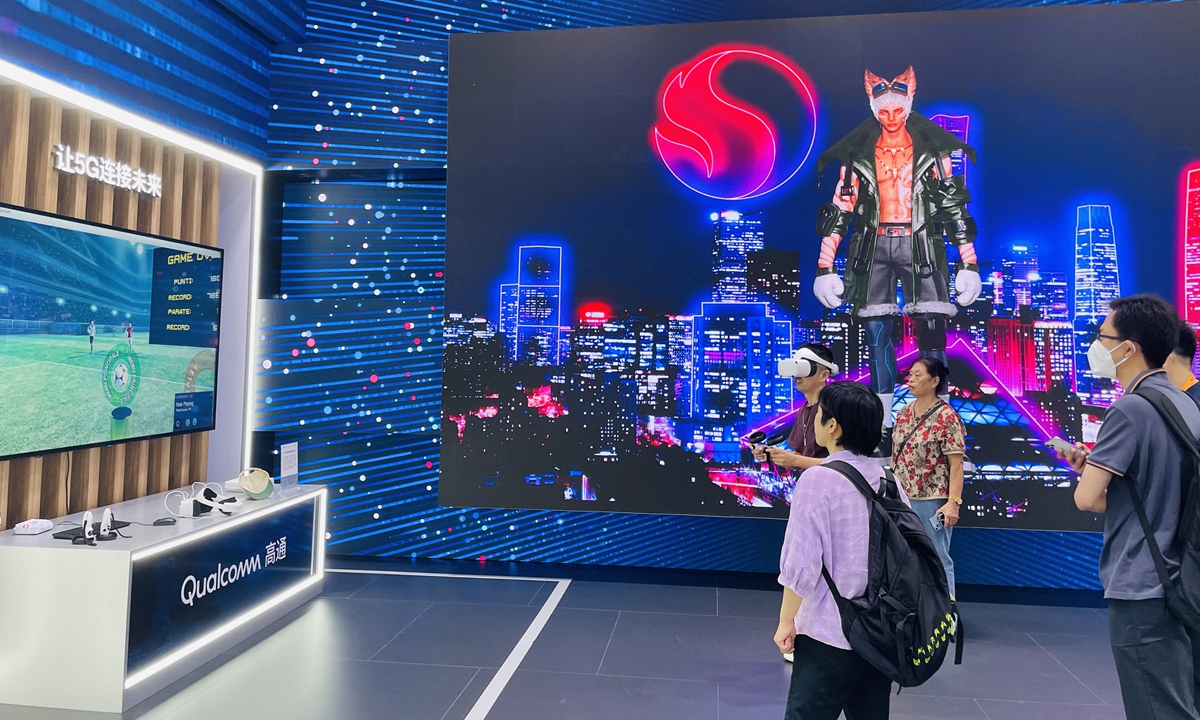
Visitors at Qualcomm's booth at the 2023 China International Fair for Trade in Services on September 6, 2023. Photo: GT/Chi Jingyi
The CEOs of some leading US semiconductor companies visited China this week to attend the China Development Forum (CDF) in Beijing, expressing their commitment to the Chinese market and willingness to pursue cooperation.
Chinese analysts pointed out on Monday that the moves showed that the companies are not thinking exactly along the same lines as the Biden administration, which tries to push for a "small yard and high fence" in the sphere of technology in its containment game against China.
Despite the US government's decoupling efforts, the CEOs of AMD, Qualcomm and Micron were among the foreign corporate heads who attended the CDF, which was held on Sunday and Monday. They also took the opportunity to meet with Chinese officials, who emphasized that China's commitment to high-level opening up will not change.
Sanjay Mehrotra, president and CEO of Micron Technology, elaborated at a CDF seminar on Monday on the importance that cooperation in China has on Micron's efforts to maintain its global lead in storage chips, and he pledged to forge the future with industry peers from around the world, including China.
On Sunday, during his meeting with AMD CEO Lisa Su, Chinese Commerce Minister Wang Wentao said that China, as an active participant in international cooperation, is a stabilizing force for the global semiconductor supply chain.
Wang said that the development of the semiconductor sector requires global cooperation, and it is hoped that the US could work together with China to draw clear security boundaries and provide stable expectations for businesses, according to a statement posted on the website of the Ministry of Commerce on Sunday.
Wang further noted that China's drive to develop new quality productive forces will offer greater opportunities to foreign companies, including American businesses.
Similar messages were sent by Wang during his meeting with Cristiano Amon, CEO of Qualcomm, a day earlier. During the meeting, Wang said that openness is a trademark of China and the Chinese government is committed to optimizing the business environment and providing services to foreign-invested enterprises in their investment and operations.
Amon said that close cooperation among countries is needed for the high-tech sector to grow, and Qualcomm hopes that the Chinese and US governments could foster stable expectations and an enabling environment for business investment and operations.
Analysts believe that the recent intensive visits to China by many US chip company executives reflect that they have different thinking from the "small yard and high fence" strategy advocated by the Biden administration.
The futility of the US government's five-year campaign to crack down on China in the technology sphere also persuaded many who had previously bet the US would win to return to the track of cooperation, they noted.
"As top beneficiaries of a highly globalized semiconductor industrial and supply chain, global chip giants know very well what China's huge market means to them," Ma Jihua, a veteran telecom observer, told the Global Times on Monday.
"The existing market share must be protected by all means, as losing market share will eat into profits. Also, the ticket to the playground of the future must be seized," Ma said, noting the importance of China's huge market to these companies' innovation capability and their chances to win the future in a fast-changing market.
For these companies, it is a choice for survival. The US government wants to decouple, but not the technology companies, because decoupling from China will threaten their very wellbeing or even existence, Ma said.
Despite its openness claims, the US has ramped up efforts to contain China's technology companies through increasingly stringent export controls using the excuse of national security. It has pushed its allies to stop selling certain chipmaking machine tools to Chinese companies and forbidden US-based Nvidia from selling consumer graphics cards in China.
In meeting with Mehrotra on Saturday, Wang said China welcomes Micron to stay deeply engaged in the Chinese market, accelerate the implementation of its investment projects in China, and fully abide by Chinese laws and regulations.
At a routine press conference on February 27, Chinese Foreign Ministry spokesperson Mao Ning said that the "small yard and high fence" of the US government will not stop China's innovation-driven development, nor will it do any good to US companies or the entire semiconductor industry.
Open cooperation is the core driving force for the growth of the semiconductor industry. China is one of the major semiconductor markets in the world. To fragment the market, destabilize global industrial and supply chains, and stymie efficiency and innovation serves no one's interests, Mao said.
The US needs to follow the principles of the market economy and fair competition, and support companies around the world in advancing science and technology through healthy competition, said Mao.




